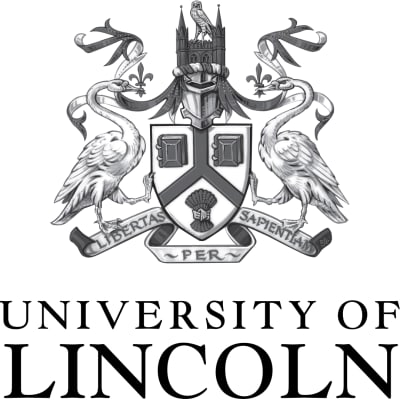
BSc (Hons) Mathematics with Philosophy
University of Lincoln

Key Information
Campus location
Lincoln, United Kingdom
Languages
English
Study format
On-Campus
Duration
3 - 4 years
Pace
Full time
Tuition fees
Request info
Application deadline
Request info
Earliest start date
Request info
Discover Lincoln Wherever You Are in the World
Our webinars, subject masterclasses, question and answer sessions, and student panel talks are a great way to discover what it is like to live and study at the University of Lincoln.
Introduction
This joint programme combines a foundation of pure and applied mathematics with the study of Philosophy, reflecting the complementary nature of these two disciplines to help explain our world and our place in it.
Mathematics with Philosophy at Lincoln combines two of the most fundamental and widely applicable intellectual skills. The course aims to provide students with the knowledge and ability to tackle quantifiable problems and to analyse issues and question assumptions. This enables them to develop their understanding of logic and reasoning.
Students have the opportunity to learn from and work alongside, our team of academics who can support and encourage them to apply imagination, creativity, and rigour to the solution of real-world problems. Individual and group projects during the course are designed to develop transferable skills.
"This information was correct at the time of publishing (July 2023)"
Admissions
Curriculum
How You Study
Students can focus on numerical and analytical methods of mathematics, while developing a range of transferable skills, including logical reasoning, critical thinking, communication, and teamwork. This combination is intended to help students to develop the skills to tackle a variety of topics from different angles. It seeks to help students find answers and evaluate the questions and the reasoning behind them.
In the first year, topics include algebra, calculus, ideas of mathematical proof, and an introduction to philosophical logic. In the second year, students progress to differential equations, scientific computing, and the philosophy of science. The third year provides the opportunity for students to select from a range of optional modules to tailor the degree to their own interests.
The course is taught via lectures, problem-solving classes, computer-based classes, and seminars.
First Year
- Algebra (Core)
- Calculus (Core)
- Geometrical Optics, Waves and Mechanics (Core)
- Ideas of Mathematical Proof (Core)
- Introduction to Moral Philosophy (Core)
- Introduction to Philosophical Logic (Core)
- Linear Algebra (Core)
- Probability and Statistics (Core)
Second Year
- Algebraic Structures (Core)
- Coding Theory (Core)
- Complex Analysis (Core)
- Differential Equations (Core)
- Existentialism and Phenomenology (Core)
- Industrial and Financial Mathematics (Core)
- Philosophy of Science (Core)
- Scientific Computing (Core)
Third Year
- Contemporary Problems in Philosophy (Core)
- Group Theory (Core)
- Mathematics Project (Core)
- Tensor Analysis (Core)
- Fluid Dynamics (Option)†
- Mathematics Pedagogy (Option)†
- Methods of Mathematical Physics (Option)†
- Newton's Revolution (Option)†
- Numerical Methods (Option)†
† Some courses may offer optional modules. The availability of optional modules may vary from year to year and will be subject to minimum student numbers being achieved. This means that the availability of specific optional modules cannot be guaranteed. Optional module selection may also be affected by staff availability.
How You Are Assessed
The course is assessed through a variety of means, including coursework, examinations, written reports, and oral presentations.
Accreditations
This programme meets the educational requirements of the Chartered Mathematician designation. This is awarded by the Institute of Mathematics and its Applications (IMA), when it is followed by subsequent training and experience in employment to obtain equivalent competencies to those specified by the Quality Assurance Agency for taught Master’s degrees.
How You Study
Students can focus on numerical and analytical methods of mathematics, while developing a range of transferable skills, including logical reasoning, critical thinking, communication, and teamwork. This combination is intended to help students to develop the skills to tackle a variety of topics from different angles. It seeks to help students find answers and evaluate the questions and the reasoning behind them.
In the first year, topics include algebra, calculus, ideas of mathematical proof, and an introduction to philosophical logic. In the second year, students progress to differential equations, scientific computing, and the philosophy of science. The third year provides the opportunity for students to select from a range of optional modules to tailor the degree to their own interests.
The course is taught via lectures, problem-solving classes, computer-based classes, and seminars.
First Year
- Algebra (Core)
- Calculus (Core)
- Geometrical Optics, Waves and Mechanics (Core)
- Ideas of Mathematical Proof (Core)
- Introduction to Moral Philosophy (Core)
- Introduction to Philosophical Logic (Core)
- Linear Algebra (Core)
- Probability and Statistics (Core)
Second Year
- Algebraic Structures (Core)
- Coding Theory (Core)
- Complex Analysis (Core)
- Differential Equations (Core)
- Existentialism and Phenomenology (Core)
- Industrial and Financial Mathematics (Core)
- Philosophy of Science (Core)
- Scientific Computing (Core)
Third Year
- Contemporary Problems in Philosophy (Core)
- Group Theory (Core)
- Mathematics Project (Core)
- Tensor Analysis (Core)
- Fluid Dynamics (Option)†
- Mathematics Pedagogy (Option)†
- Methods of Mathematical Physics (Option)†
- Newton's Revolution (Option)†
- Numerical Methods (Option)†
† Some courses may offer optional modules. The availability of optional modules may vary from year to year and will be subject to minimum student numbers being achieved. This means that the availability of specific optional modules cannot be guaranteed. Optional module selection may also be affected by staff availability.
How You Are Assessed
The course is assessed through a variety of means, including coursework, examinations, written reports, and oral presentations.
Accreditations
This programme meets the educational requirements of the Chartered Mathematician designation. This is awarded by the Institute of Mathematics and its Applications (IMA), when it is followed by subsequent training and experience in employment to obtain equivalent competencies to those specified by the Quality Assurance Agency for taught Master’s degrees.
Gallery
Program Outcome
How You Study
Students can focus on numerical and analytical methods of mathematics, while developing a range of transferable skills, including logical reasoning, critical thinking, communication, and teamwork. This combination is intended to help students to develop the skills to tackle a variety of topics from different angles. It seeks to help students find answers and to evaluate the questions and reasoning behind them.
In the first year topics include algebra, calculus, ideas of mathematical proof, and an introduction to philosophical logic. In the second year students progress to differential equations, scientific computing, and the philosophy of science. The third year provides the opportunity for students to select from a range of optional modules to tailor the degree to their own interests.
The course is taught via lectures, problem solving classes, computer-based classes, and seminars.
Scholarships and Funding
For eligible undergraduate students going to university for the first time, scholarships and bursaries are available to help cover costs. The University of Lincoln offers a variety of merit-based and subject-specific bursaries and scholarships
Several scholarship options are available. Please check the university website for more information.
Program Tuition Fee
Career Opportunities
Graduates may pursue careers in the fields of science, education, finance, business, consultancy, and research and development. This degree promotes skills in creative, critical, and independent thinking. It may prove beneficial in careers requiring flexibility and the ability to formulate a persuasive case. This could include careers in politics and the media, as well as the civil service, among other areas. Some graduates may choose to continue their studies at postgraduate level.